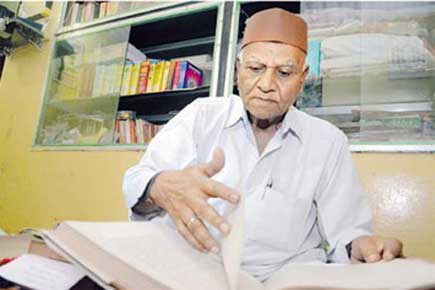Worli resident Pandit Gulam Dastagir, one of the few scholars with a strong foundation in both Sanskrit and Islam, has spent his life propagating one of the world’s oldest languages

In downtown Worli, it is common to hear an unusual greeting of ‘Assalamu-Alaikum, Guruji’ whenever an 80-year-old Muslim man steps out of his modest home. He is renowned Sanskrit scholar Pandit Gulam Dastagir, who over six decades has impressed the Shankaracharyas, late prime minister Indira Gandhi, RSS leaders and Islamic scholars, all with equal elan. Armed with a deep knowledge of both Islam and Sanskrit, Pandit Dastagir can speak with authority on any religious topic. Born in Chikhali village in Solapur district, Pandit Dastagir completed his schooling before joining a government Sanskrit institution.

Pandit Gulam Dastagir. Pic/IANS
ADVERTISEMENT
“I was the only Muslim student in a class of four dozen Brahmins. My Brahmin Guruji developed a liking for me and
encouraged me. I acquired my entire Sanskrit knowledge of the scriptures, Vedas and other texts there,” says Pandit Dastagir.
Around mid-1950s, he shifted to Mumbai and joined the Maratha Mandir Sansthan’s Marathi-medium Worli High School as a Sanskrit teacher for all classes. Two decades later, to comply with professional requirements, he appeared directly for a Master’s degree in Sanskrit from Mysore University.
After the Emergency, when the Janata Party ruled India, Pandit Dastagir was suddenly targeted. “They suspected I was a namesake Muslim propagating the RSS and Jana Sangh ideology through Sanskrit. It was only after a long investigation that they were proved wrong,” he chuckles.
When Indira Gandhi returned to power in 1980, she summoned him and was surprised to discover that Pandit Dastagir was actually a ‘Syedvanshi’, or belonging to a clan considered the direct descendents of Prophet Mohammed. “She met me several times and appreciated my knowledge and love for Sanskrit. In 1982, she told the education ministry to appoint me as a ‘Rashtriya Sanskrit Pracharak’,” Pandit Dastagir says. When baffled officials asked Gandhi how should
his duties be classified, she reportedly shot back: “He will teach us what needs to be done. Let him function independently.”
For two years, he toured India extensively and propagated Sanskrit in government and private institutions. He quit the post after Gandhi’s assassination in 1984. “I acquired my MA in Sanskrit only in 1987 at the age of 50, although I was proficient in the language long before.” Since his retirement, Pandit Dastagir lectures on the similarities
between Islam and Hinduism with reference to various aspects of one of the world’s oldest and richest languages, Sanskrit. “Sanskrit is not only for Brahmins. But this perception made the masses reluctant to study it. I create awareness about Sanskrit all over India among different castes and religions,” he said.
Pandit Dastagir explained that Hinduism does not recognise ‘conversions’ or the caste system. “The current craze for ‘conversions’ has no basis in Hindu scriptures. It is not recognised. At best, you can change a person’s name, not his soul from the religion of his/her birth,” he said.
Pandit Dastagir says he has never encountered objections from fellow Muslims over his passion for Sanskrit. “Comparative study of different religions makes you more reasonable. I am not a fanatic, just an ordinary Muslim.”
 Subscribe today by clicking the link and stay updated with the latest news!" Click here!
Subscribe today by clicking the link and stay updated with the latest news!" Click here!







